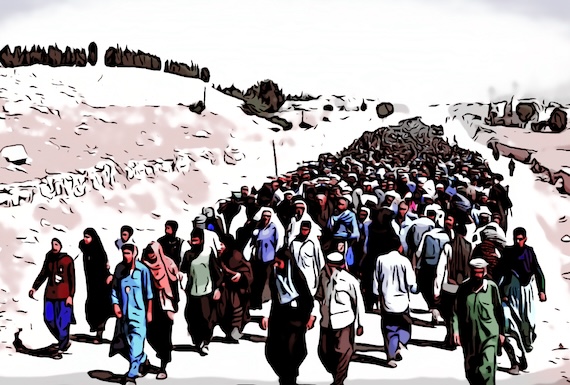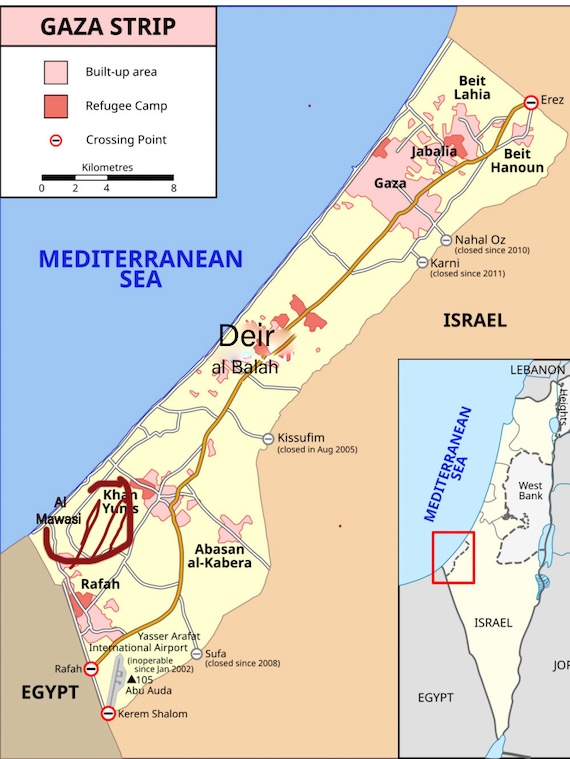Ann Arbor (Informed Comment) – The Israelis are not only expelling thousands of innocent civilians from the town of Deir al-Balah in the center of the Gaza Strip, they gave only a few hours notice that some 200 UN personnel had to abruptly depart their offices and dwellings there. UN head of safety and security, Gilles Michaud, told Al Jazeera, “the timing could hardly be worse,” given that the UN is ramping up an enormous polio vaccination campaign, which will require a large number of new UN personnel to get on the ground in Gaza.
The Israeli expulsions were so disheartening that on Monday, an anonymous senior UN official told Reuters, “We’re unable to deliver today with the conditions that we’re in. As of this morning, we’re not operating in Gaza.”
On Tuesday, Michaud tried to clean up the leak, insisting, “The United Nations is determined to stay in Gaza.” He added, “Humanitarian aid delivery continues – a tremendous feat given that we are operating at the upper-most peripheries of tolerable risk. Mass evacuation orders are the latest in a long list of unbearable threats to UN and humanitarian personnel.”
The UN Office for the Coordination of Humanitarian Affairs reports that the extensive and brutal Israeli expulsion orders forcing Palestinians from Deir al-Balah, the last effective humanitarian hub in the Gaza Strip, have made it almost impossible for UN humanitarian agencies to do their work, since they have to leave, as well.
The new Israeli expulsion directives in Deir al Balah, forcing people south to al-Mawasi on the Mediterranean coast, have displaced humanitarian personnel from various UN agencies, NGOs, and service organizations, along with their families, significantly obstructing their ability to provide crucial assistance and services. Specifically, the directive issued on 25 August had a dire impact on 15 UN and NGO facilities, in addition to four UN storage sites.
OCHA coordinator for humanitarian affairs in Gaza, Muhannad Hadi, warned, “The water supply in Deir al Balah has decreased by at least 70 per cent due to the shutdown of pumps and desalination plants located within evacuation zones. A severe chlorine shortage for water disinfection, with reserves expected to last only one more month, is fueling disease, skin infections, hepatitis A and now polio.”
OCHA quotes Doctors without Borders (MSF), which said on Monday that many people had opted to flee from the Al Aqsa Hospital, prompted by the close proximity to the latest area designated for evacuation in Deir al Balah and an explosion that occurred 250 meters from the hospital. Citing the Ministry of Health, MSF added that, out of approximately 650 patients, only 100 now remain in the hospital. The Israeli army said that it had not demanded people leave the medical facilities, according to the BBC, but it clearly created conditions by fighting near them in Deir al-Balah that impelled people to flee. OCHA says of this war, “As of 20 August, WHO had recorded 505 [Israeli] health attacks in the Strip, which had resulted in 752 people killed, 982 injured, and 32 hospitals and 63 ambulances damaged.”
OCHA says that expulsion directives and hostilities near hospitals and medical centers continue to jeopardize these facilities by rendering them potentially non-operational due to insecurity and lack of safe access for patients, ambulances, and health organizations to resupply them. Hospitals are running out of the diesel fuel necessary for their electricity generators.
Almost daily fresh Israeli-issued expulsion directives are further aggravating the humanitarian crisis, having a severe impact on hundreds of thousands of individuals. Between 23 and 25 August, the Israeli armed forces issued three new expulsion directives affecting over 19 districts in Northern Gaza and in Deir al Balah. Over 8,000 individuals were residing in the areas designated for expulsion of the population, many in 13 internally displaced person (IDP) camps.

“Refugees Again,” Digital, Dream/ Dreamland v3 / Clip2Comic, 2024
In August, the Israeli armed forces issued a total of 16 expulsion directives, affecting 258,000 people, about 12 percent of Gaza’s population. They have forced the entire population of over 2 million people to huddle in the southwestern area of Al Mawasi (circled on the map below). Al Mawasi was not a city, just more or less some dunes in the desert and a small town, and it is not suitable as a refuge for so many civilians.

Via Wikimedia Commons, Gringer (talk) 14:01, 8 January 2009 (UTC); file licensed under the Creative Commons Attribution-Share Alike 3.0 Unported license.. Modified by Juan Cole, 8/27/2024.
The extreme overcrowding in Al Mawasi, with a density of 30,000 to 34,000 individuals per square kilometer, has worsened the acute shortage of vital resources such as water, sanitation and hygiene supplies, healthcare services, protection, and shelter. Al Mawasi comprises approximately 11 percent of Gaza’s total area, only around 41 square kilometers. The zone is deficient in crucial infrastructure and fundamental services, while the provision of aid is restricted because of access and security challenges.
Hadi said,”They are forcing families to flee again, often under fire and with the few belongings they can carry with them, into an ever-shrinking area that is overcrowded, polluted, with limited services and – like the rest of Gaza – unsafe. People are being deprived of access to services essential for their survival, including medical facilities, shelters, water wells and humanitarian supplies.”

 © 2026 All Rights Reserved
© 2026 All Rights Reserved